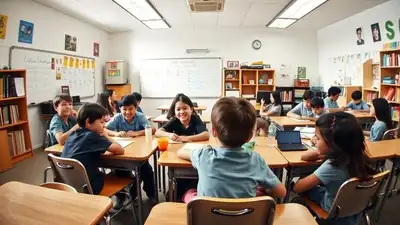With no national plan, how educators lead a learning revival for US students amid political neglect

For decades, the pursuit of academic excellence was a shared political priority in the US. Both Republican and Democratic leaders once positioned themselves as champions of student achievement, recognizing reading and math proficiency as both a national responsibility and a viable electoral promise.But that era appears to be over. As reported by The New York Times, no major US political figure today seems committed to a serious agenda for improving academic learning. In a time of intense ideological conflict, measurable educational goals have fallen off the radar, leaving student outcomes to suffer.A decline in national leadership on educationSince taking office, President Trump has shifted the federal focus away from learning outcomes and toward cultural and ideological issues. He canceled federal exams designed to track student progress and ended programs that shared effective teaching strategies with schools. As reported by The New York Times, a spokeswoman for the administration defended these decisions by pointing to low test scores, stating, “What we are doing right now with education is clearly not working.”Trump’s administration has instead prioritized “patriotic” curricula and launched investigations into how schools handle race and gender issues. But as The New York Times noted, none of these efforts add up to an agenda centered on learning.Democrats have largely responded by defending the education status quo. While they’ve fought to protect the Department of Education from elimination and challenged funding cuts, they’ve offered little in terms of a comprehensive strategy for student learning. As The New York Times reported, even when Democratic leaders such as Kamala Harris addressed education, the focus was on book bans or student debt—not on improving core instruction.Alarming trends in academic performance and college outcomesStudent performance indicators show a troubling picture. Reading scores are now at their lowest point in decades, according to The New York Times. Meanwhile, college outcomes are also suffering—40% of students who begin college do not graduate, often leaving with debt and insufficient job-ready skills.Former education secretary Arne Duncan stated, “Right now, there are no education goals for the country,” as quoted by The New York Times. He added there are no clear metrics, strategies, or transparency in place to drive improvement. Michael Petrilli of the Thomas B. Fordham Institute echoed this sentiment, noting that national conversations rarely mention achievement gaps or social mobility.How bipartisan reform collapsedDuring the Bush and Obama administrations, bipartisan efforts like No Child Left Behind and the Common Core aimed to raise academic standards. These policies showed early gains, particularly for the lowest-performing students. However, the emphasis on testing led to excessive test prep, reducing time for science and social studies, according to The New York Times.Widespread backlash followed. On the right, there was resistance to federal oversight. On the left, parents increasingly opted students out of testing—20% did so in New York in 2015. Ultimately, Obama signed the Every Student Succeeds Act, unraveling much of his own policy legacy.Learning beyond politicsDespite political neglect, a new grassroots movement is emerging. As The New York Times detailed, educators and advocates are emphasizing the importance of a rigorous, knowledge-rich curriculum. In Louisiana, for example, students at Highland Elementary engage with advanced vocabulary and historical context—without screens.Groups like the Knowledge Matters Campaign, led by Barbara Davidson, promote such evidence-based approaches. Davidson, who served under Presidents Reagan and George H.W. Bush, believes these strategies correct past policy excesses.Structured phonics has seen success in early literacy, but broader knowledge-building in subjects like history and science is also essential. Jon Gold, a teacher in Providence, Rhode Island, told The New York Times he moved back to paper-based reading, finding “reading comprehension is stronger” without screens.The future of education reformWhile public school satisfaction is at a 25-year low and enrollment continues to fall, some leaders are responding. Democrat Jake Auchincloss has called on his party to take accountability for school closures and proposed taxing social media to fund tutoring. Republican Senator Tom Cotton supports taxing elite university endowments to fund job training for high school graduates.As reported by The New York Times, these efforts suggest the possibility of a new political platform—one rooted in learning outcomes, not ideological battles. The question now is whether the US will recognize the academic crisis for what it is and act accordingly.




